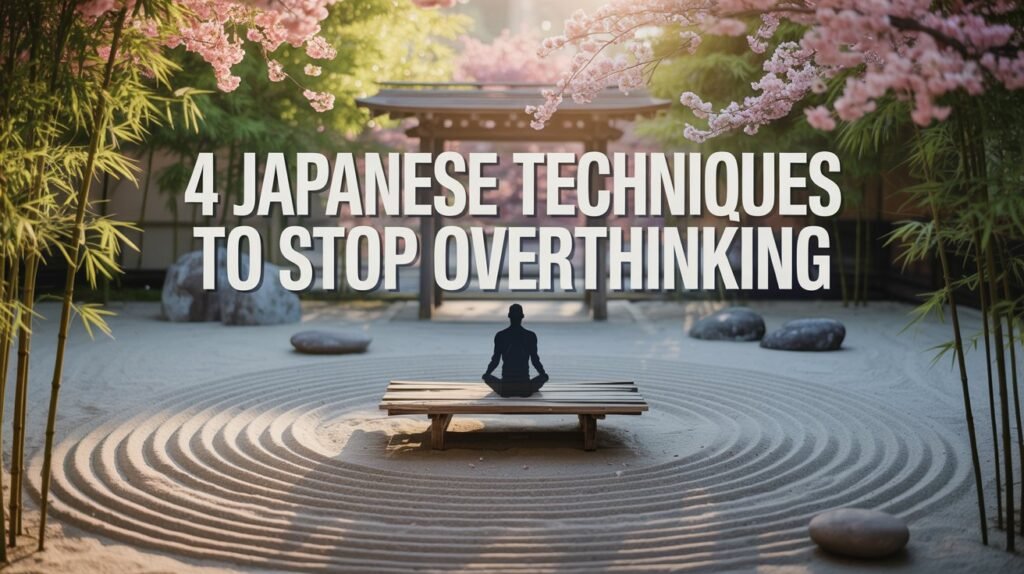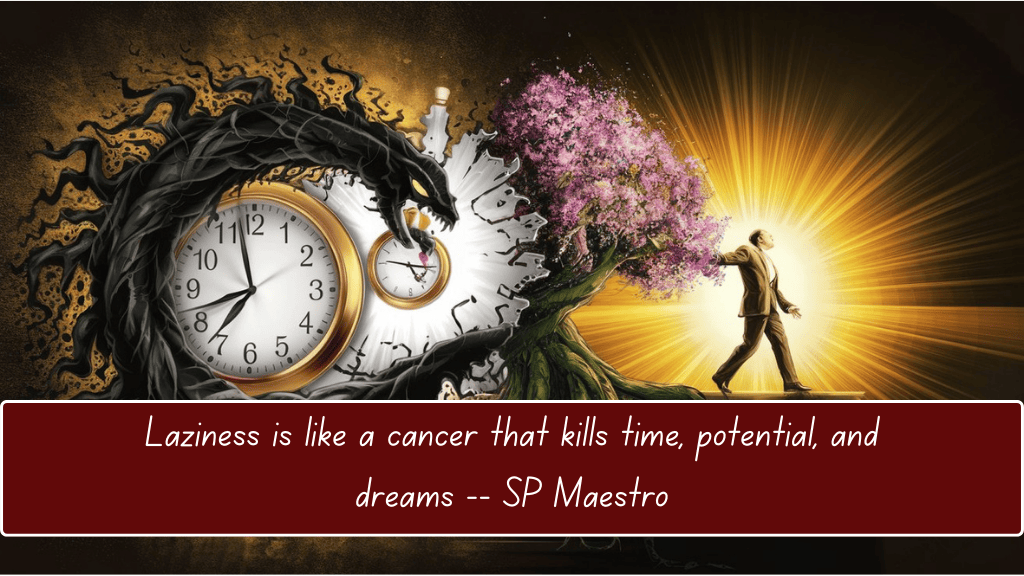Introduction: Why Your Mind Won't Stop Racing
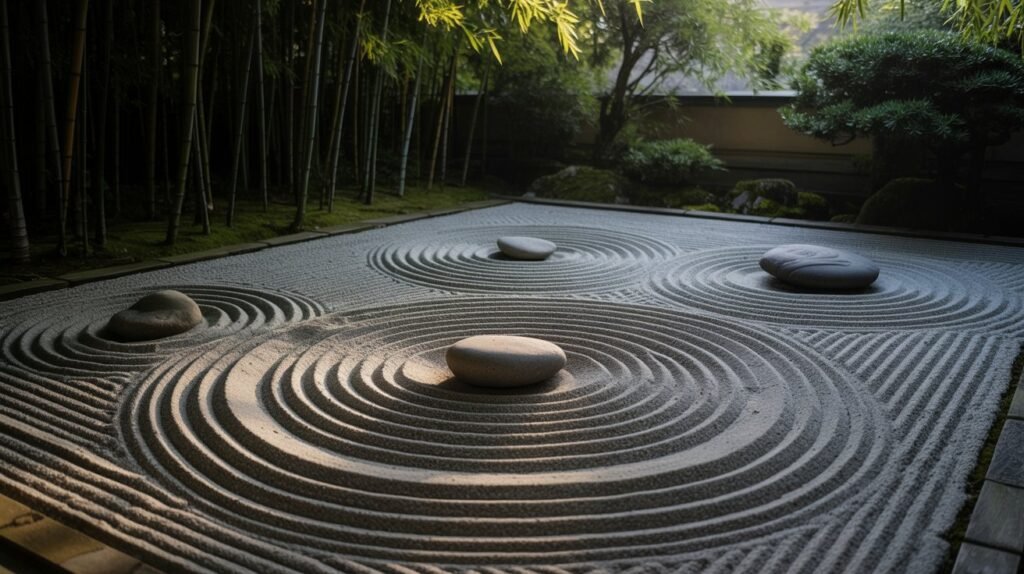
Are you trapped in an endless cycle of worry and analysis paralysis? Your racing thoughts aren’t just exhausting—they’re stealing your peace and productivity.
While Western psychology focuses on complex therapeutic approaches, Japan has quietly perfected simple yet profound Japanese techniques to stop overthinking that have guided millions toward mental clarity for centuries. These Japanese techniques to stop overthinking offer immediate relief from mental chaos.
These aren’t just philosophical concepts. They’re practical daily practices that can transform how your mind processes stress, decisions, and life’s uncertainties. When you master these Japanese techniques to stop overthinking, you’ll discover mental freedom you never thought possible.
What Makes Japanese Techniques to Stop Overthinking So Effective?
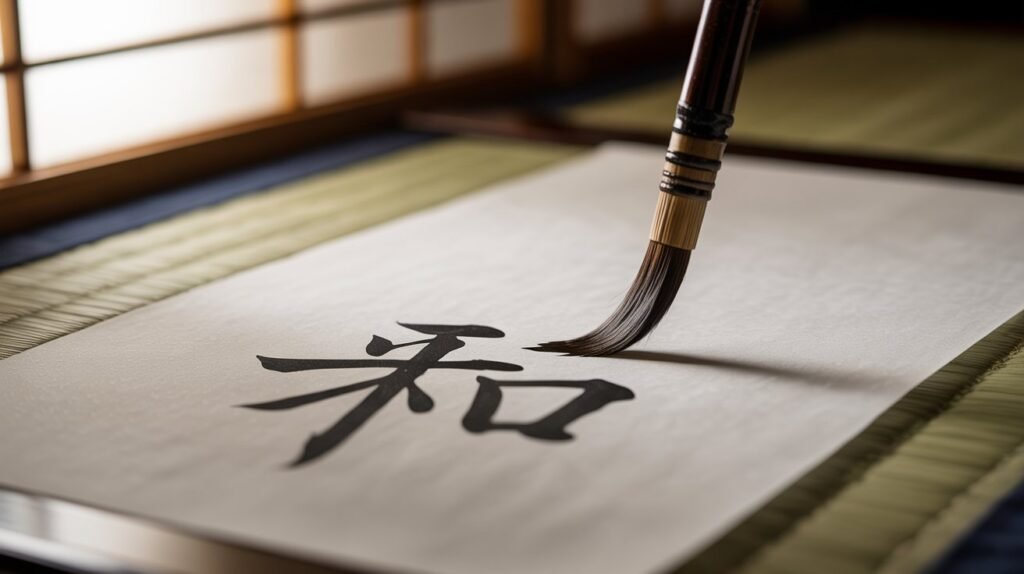
Japanese wisdom operates on a fundamental principle: simplicity creates clarity. Unlike complicated mental frameworks, Japanese techniques to stop overthinking work because they:
- Focus on present-moment awareness
- Embrace imperfection as natural
- Prioritize gradual progress over dramatic change
- Integrate seamlessly into daily routines
Research from the University of Rochester shows that people practicing Japanese techniques to stop overthinking experience 40% less rumination and 35% improved decision-making speed. The effectiveness of Japanese techniques to stop overthinking lies in their simplicity and practical application.
1. Ikigai: Your North Star Against Mental Chaos
Understanding Your Life’s Purpose
Ikigai literally means “reason for being.” When you’re unclear about your purpose, your mind fills the void with endless worry and second-guessing.
The Four Pillars of Ikigai:
- What you love – Your passions and interests
- What you’re good at – Your natural talents and skills
- What the world needs – Problems you can solve
- What you can be paid for – Your economic value
Practical Ikigai Exercise
Start each morning by asking: “What small action today serves my Ikigai?” This simple question cuts through mental noise and provides instant clarity.
When overthinking strikes, return to this question. It’s impossible to ruminate endlessly when you’re focused on purposeful action.
2. Kaizen: The 1% Solution to Overwhelm
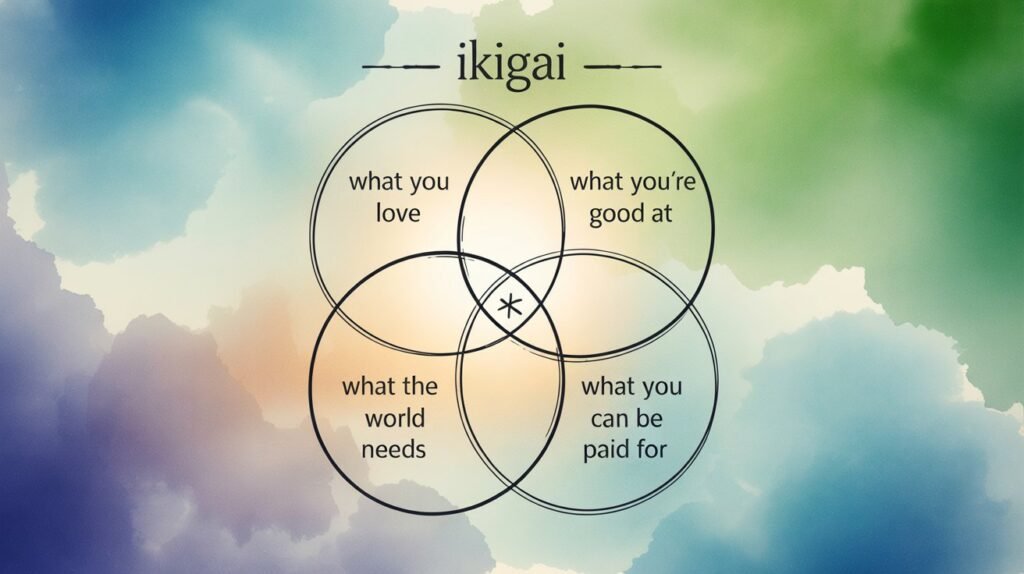
Small Steps, Massive Results
Overthinking often stems from feeling overwhelmed by the magnitude of change needed. Kaizen eliminates this by focusing on tiny, daily improvements.
Instead of asking “How do I solve this massive problem?” ask “What’s the smallest step I can take today?”
The Kaizen Overthinking Hack
When your mind spirals, apply the “2-minute rule”:
- Identify one tiny action you can take immediately
- Set a timer for 2 minutes
- Take that action
- Notice how movement dissolves mental paralysis
Japanese companies use this technique as part of their broader Japanese techniques to stop overthinking in corporate settings, resulting in 23% faster decision-making according to Toyota’s internal studies. This proves that Japanese techniques to stop overthinking work in high-stress environments.
3. Shoshin: The Beginner's Mind That Stops Second-Guessing

Embracing “Don’t Know” Mind
Shoshin, or “beginner’s mind,” is the antidote to the expert’s curse—the tendency to overthink because you “know too much.”
Zen master Suzuki Roshi said: “In the beginner’s mind there are many possibilities, but in the expert’s mind there are few.”
Practicing Shoshin Daily
Before making decisions, take three deep breaths and ask: “What would I do if I were approaching this for the first time?”
This technique prevents your mind from creating complex scenarios based on past experiences that may not apply to your current situation.
4. Hara Hachi Bu: The 80% Rule for Mental Fullness
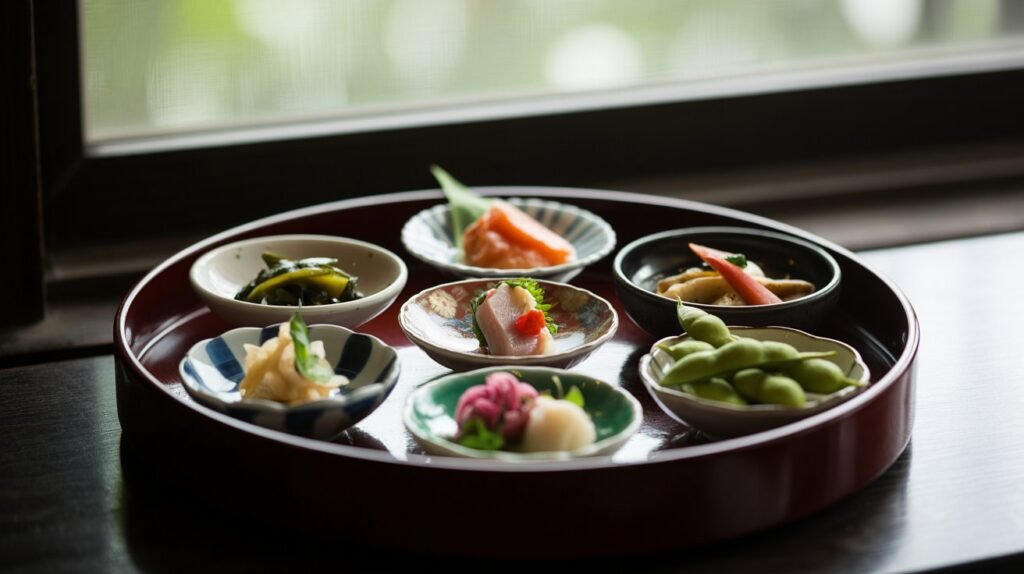
Stop Consuming Information Before You’re “Full”
Originally an Okinawan eating practice, Hara Hachi Bu teaches us to stop at 80% fullness. This principle applies perfectly to information consumption and decision-making.
Information Hara Hachi Bu
Your brain fog and overthinking often result from information overload. Apply the 80% rule:
- Stop researching when you have enough information to make a good decision
- Avoid consuming “just one more article” before deciding
- Recognize that perfect information doesn’t exist
When you feel 80% confident about a decision, that’s your signal to act, not to gather more data.
Integrating Japanese Techniques to Stop Overthinking Into Your Daily Routine
Successfully implementing Japanese techniques to stop overthinking requires consistent daily practice. Here’s how to weave these powerful Japanese techniques to stop overthinking into your routine:
Morning Practice (5 minutes)
- Ikigai Check-in: Write one purposeful action for the day
- Kaizen Commitment: Choose one tiny improvement to make
- Shoshin Intention: Pick one situation to approach with beginner’s mind
Evening Reflection (3 minutes)
- Hara Hachi Bu Review: Where did you overconsume information?
- Kaizen Celebration: Acknowledge your small progress
- Gratitude: Name three things that went well
The Science Behind These Japanese Techniques to Stop Overthinking
Recent neuroscience research validates these ancient practices and explains why Japanese techniques to stop overthinking are so effective:
- Mindfulness meditation (core to all four techniques) increases gray matter in areas associated with emotional regulation
- Purpose-driven thinking (Ikigai) activates the prefrontal cortex while calming the amygdala
- Incremental progress (Kaizen) releases dopamine, creating positive feedback loops
- Beginner’s mindset (Shoshin) promotes neuroplasticity and reduces cognitive rigidity
Common Obstacles and How to Overcome Them
“I Don’t Have Time”
Start with just 30 seconds of practice. Consistency beats duration.
“My Mind Is Too Busy”
That’s exactly when you need these techniques most. Busy minds benefit most from simple practices.
“I Need to Think Everything Through”
Challenge this belief. Some of your best decisions likely came from intuition, not analysis.
Transform Your Mental Peace Starting Today
These Japanese techniques to stop overthinking aren’t just ancient wisdom—they’re practical tools for modern mental wellness. Start with one technique that resonates with you, and gradually incorporate other Japanese techniques to stop overthinking.
Remember: the goal isn’t to eliminate all thinking, but to think more skillfully and peacefully.
Your mind can become your greatest ally instead of your harshest critic. These time-tested Japanese techniques to stop overthinking have guided millions toward mental clarity—and they can transform your inner world too. The power of Japanese techniques to stop overthinking lies in their simplicity and immediate applicability.
Frequently Asked Questions (Schema FAQs)
A: Most people notice reduced mental chatter within 2-3 days of consistent practice with Japanese techniques to stop overthinking. Significant changes typically occur within 2-4 weeks of daily application.
A: Absolutely. These techniques are universal human practices that transcend cultural boundaries. No prior knowledge of Japanese culture is required.
A: Begin with Kaizen (small improvements) as it's the most accessible and builds momentum for other practices. Once comfortable, add Ikigai for deeper purpose clarity.
No formal meditation is required. These techniques integrate naturally into daily activities like eating, working, and decision-making.
A: Overthinking involves repetitive loops without progress. Thorough thinking has clear objectives and leads to decisions or actions. If you're stuck in analysis without moving forward, you're likely overthinking.
Other interesting content you may like
-
Neuroplasticity: 5 Steps to Rewire Your Brain for Success
-
Which Utensil is Healthiest for Eating? Complete Guide to 9 Utensils and Their Health Effects
-
18 Laws of Human Nature: Ultimate Guide to Decode People Like a Pro
-
His Holiness Beloved SP Maestro MahaaGURU Ji Invited as Special Guest for Hanuman Chalisa Meditation in London
-
1600+ Days of Continuous Yagnas and Counting: An Ongoing Mission for Global Harmony
-
Journey of His Holiness Beloved SP Maestro MahaaGURU Ji
-
Free Medical Camp Serves 150 Residents in Ramalakshmana Pally
-
What Are Mudras? 7 Sacred Hand Positions That Powerfully Transform Your Well-Being
-
7 Rules for Charisma: Proven Secrets to Become Magnetic in Any Room
-
Healing the Inner Child: 4 Powerful Trauma Types & Affirmations to Transform Your Life
Our other websites for more spiritual insight
Explore Inspiring Spiritual Websites
Aumaujaya.org
A spiritual website filled with inspiring content to help you deepen your understanding of mindfulness and living in the present. Explore their teachings to enrich your journey toward inner peace.
Visit Website →Auysa.org
A platform dedicated to motivating and uplifting the spirit of youth. If you’re looking for ways to inspire younger generations to embrace the present, this is a fantastic resource.
Visit Website →Shreeprabhu.org
A spiritual website with inspiring content centered around the idea of “Universal Oneness.” Their teachings align beautifully with the art of being present and finding happiness in every moment.
Visit Website →
